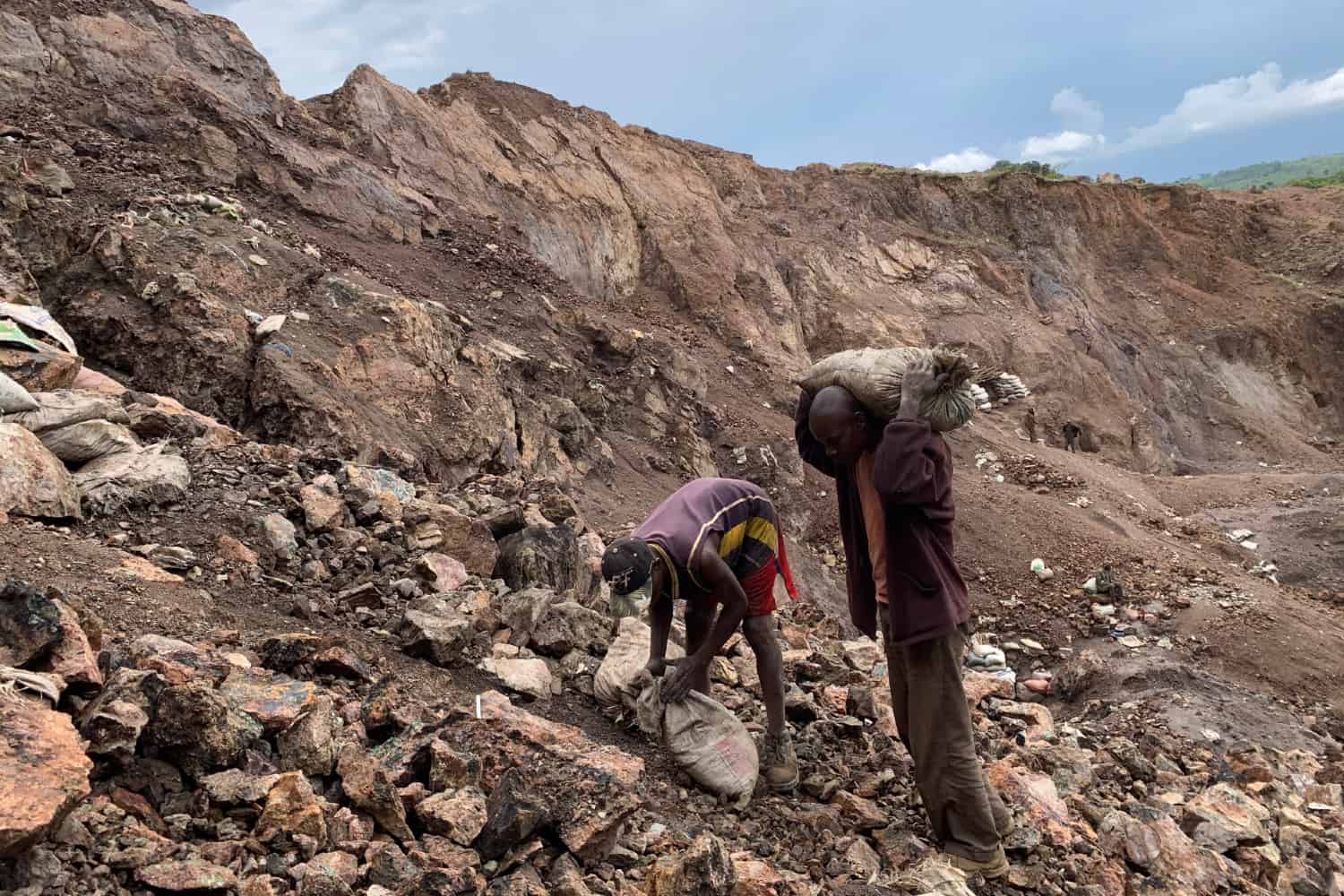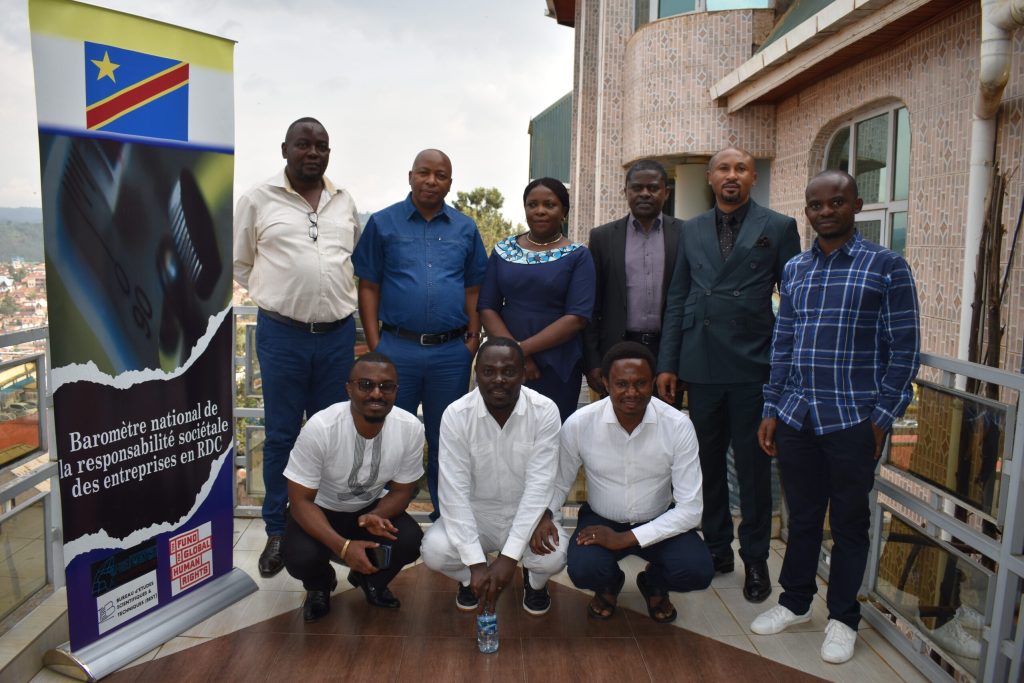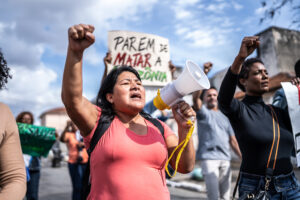The world runs on Congolese cobalt. As global demand surges, these local activists want to make sure that Congolese communities benefit too.

Whether you know it or not, much of your life is powered by Congolese cobalt—and by the people who mine it. There’s a little piece of cobalt in nearly every smartphone, tablet, and laptop.
That makes cobalt indispensable to global tech and manufacturing companies. But cobalt extraction is a major driver of human rights abuses. From families displaced by transnational mining conglomerates to the destructive environmental impacts of open-pit mining, the cobalt supply chain is fueled by significant human and environmental harms.
So when Apple—the world’s largest tech company—announced a change to its cobalt supply chain in April, it also reaffirmed its commitment to help communities impacted by extractive industries. For more than five years, the Fund has partnered with Apple to support activists working with miners and mining-affected communities in the Democratic Republic of the Congo (DRC), where the exploitative cobalt mining industry has harmed the lives and livelihoods of Congolese people.
As Apple noted in a recent press release:
As Apple reduces its reliance on newly mined minerals, it is also pursuing ways to directly support communities whose livelihoods depend on mining. The company is partnering with experts such as the Fund for Global Human Rights to provide support for frontline human rights and environmental defenders, including in the African Great Lakes region, as well as vocational education programs that enable members of local communities moving away from mining to build skills and pursue new opportunities.
Apple’s announcement coincides with the five-year anniversary of the DRC’s new mining code—a revised set of standards and regulations intended to improve corporate social responsibility and share mining profits with local communities. Grassroots activists supported by the Fund are playing a critical role in ensuring that the new laws are implemented and enforced in the country’s mining regions.
This is essential local action with enormous global implications. Because as demand surges, the race for the DRC’s vast cobalt reserves is only just beginning.
A Human and Environmental Disaster
Cobalt is one of the most ubiquitous metals in modern life. It’s a crucial part of the lithium-ion batteries that power our rechargeable devices. Without the energy density of cobalt, our phones, tablets, and even toothbrushes would lose their charge much faster.
That key attribute makes cobalt essential to green energy, too. The electric vehicle revolution is powered by batteries that contain kilograms of cobalt—more than 1,000 times the amount in a smartphone. As the market for electric vehicles heats up, demand for cobalt is skyrocketing. A 2020 World Bank report projects that cobalt production will have to increase by up to 500 percent by 2050 to meet clean energy goals.
Roughly half of the world’s cobalt reserves are found in the resource-rich earth of the DRC—one of the poorest countries on the planet. Nearly three-quarters of the global supply of mined cobalt comes from just two Congolese provinces, Haut-Katanga and Lualaba, in what’s known as the Central African Copperbelt.
In the DRC’s artisanal mining sector—which exists alongside the formal mining industry—children and adults toil underground for hours in dangerous tunnels, using sticks or makeshift tools to mine for the cobalt-rich mineral heterogenite. Others sift ore in noxious, contaminated waters. With no protective equipment, injuries and deaths are common. Their take-home pay at the end of the day is often less than $2.
The human and environmental destruction caused by mining in the DRC is staggering. Entire communities have been forced to leave their homes to make way for a new mining concession. Toxic waste has contaminated critical water sources and arable land. Millions of trees have been razed. The air, hazy with dust and particulates from open-pit mines, is dangerous to breathe.
These inhumane working conditions, environmental harms, and the exploitative companies that underpin the deadly global cobalt trade aren’t a recent phenomenon in the DRC. From the rubber farms of King Leopold’s brutal Congo Free State in the 1890s to the palm oil plantations and uranium mines of the twentieth century, cobalt mining is just the latest chapter in a centuries-long story of exploitation in the DRC. But despite the continuing legacy of colonial resource extraction, local activists in the DRC have a vision for a better, fairer future.

Local Activists Lead the Way
With the Fund’s support, Congolese civil society is working to disrupt the mining industry and break the cycle of rapacious global exploitation.
In 2018, several Fund grantees were instrumental in drafting key provisions of a sweeping new mining reform bill meant to address resource abuse and human rights violations in the country’s extractive sector. The law codifies the need for improved corporate social responsibility and raises royalties on mining companies operating in the DRC. It mandates that mining permit holders give a percentage of their annual revenue back to those affected by extractive industries and join monitoring committees to work with local communities toward full implementation.
These new protections in the mining code represent a big step forward for human rights in the DRC. But for Congolese civil society, the real work lies ahead: ensuring that mining companies and the Congolese government adhere to the revised standards, so that miners and mining-affected communities benefit from these hard-fought reforms and financial windfalls.
Action Contre l’Impunité pour les Droits de l’Homme, or ACIDH, is a Fund grantee in Haut-Katanga Province. ACIDH advocates for the rights of local communities in the mining sector, focusing especially on the Ruashi mine—an enormous open-pit cobalt and copper concession near Lubumbashi, the capital of Haut-Katanga.
ACIDH takes the fight directly to the mining companies and government authorities who reap enormous profits from the devastating extractive industry. Their research has not only exposed coercive and manipulative tactics by the company that operates the Ruashi mine, but it’s also uncovered government corruption at the national level.
In South Kivu Province, Bureau d’Etudes Scientifiques et Techniques, or BEST, is taking a different tack. Their new Corporate Social Responsibility (CSR) Barometer project will measure whether mining companies are compliant with social responsibility standards. By recognizing best practices and naming and shaming bad actors, BEST aims to foster a culture of accountability in the Congolese mining sector.
BEST also works with local leaders to educate communities on their rights and ensure that key provisions of the mining code are fully and properly implemented. They provide trainings and capacity-building workshops to educate artisanal miners on how to advocate for improved working conditions. And they have partnered with universities to expand local literacy and access to information about human rights.
As global demand for electric battery–powered technology surges, the mad scramble for the DRC’s cobalt reserves will only intensify. Grassroots groups like ACIDH and BEST are essential to protecting and promoting the human rights of Congolese miners and communities affected by the extractive industry. The Fund’s partnership with Apple shows how corporations and the human rights community can work together to raise our global standards and support vital local action.
Sign up to our newsletter
Add some impact to your inbox.
By submitting this form, you accept that your data will be stored and processed in line with our Privacy Policy.



